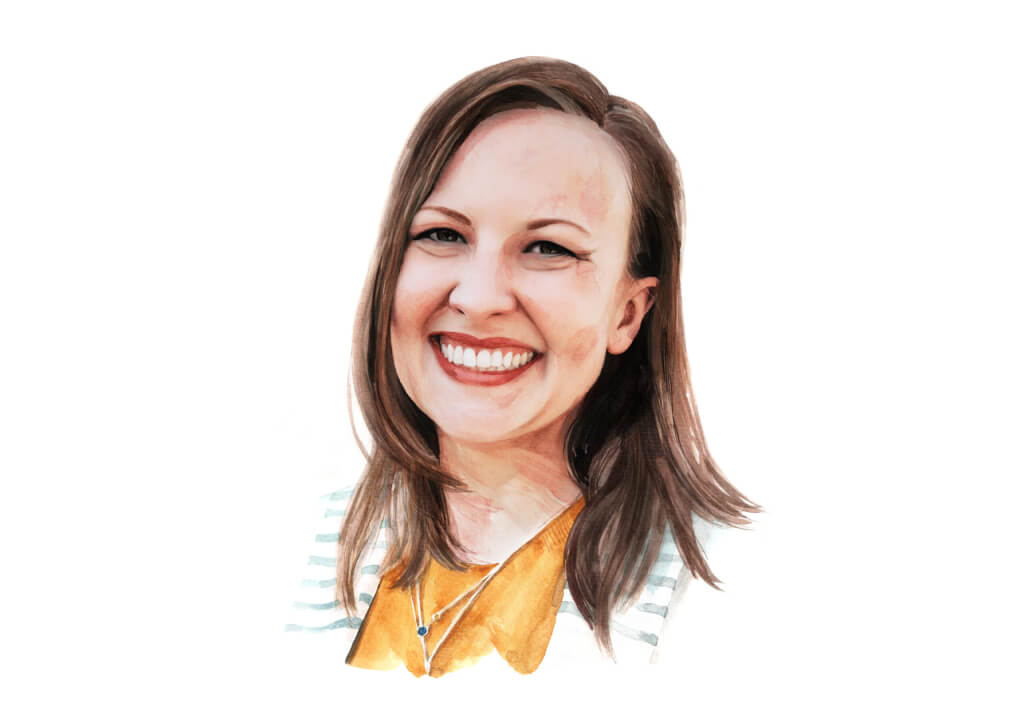Tracy Borreson – Master Brand Story Teller and Consultant

Tracy Borreson is obsessed with authenticity. In a world saturated with cookie-cutter marketing campaigns, Tracy helps companies and their employees harness their unique identities. Unlike traditional marketing advisors who peddle generic blueprints, Tracy’s approach uncovers a company’s true essence and guides them toward strategies, tactics, channels, and platforms that showcase their authenticity. She firmly believes that mindlessly following popular or available strategies and tactics has become the poison of marketing.
Tracy’s journey toward authenticity began with her struggle to recognize her true self. Growing up in St. Albert, Alberta, as the oldest of three sisters, Tracy believed she constantly needed to prove her worth and earn her place in her family. As a perfectionist, she strived for accomplishments and achievements to validate her existence.
Tracy’s childhood dreams of becoming an astronaut reflected her innate desire for adventure, exploration, and stepping outside her comfort zone. Although space may not have been the right frontier for her, Tracy’s experience at Space Camp in Huntsville, Alabama, where she won the “Right Stuff” award – still a point of pride for her – instilled in her a sense of accomplishment and the belief that she could overcome challenges. “I was the space station commander. I almost crashed the space station out of orbit, but I didn’t. That feels like a huge accomplishment, and not because everything went perfectly. They tried to throw us off with fires and things like that. In the end, we overcame so many things, and we all ‘survived.'”
Tracy admits there are pros and cons of perfectionism. She always tried to earn love and respect through accomplishments and achievements. While perfectionism brought Tracy success in terms of achievements, it also affected her mental and emotional well-being.
Tracy’s mother was a neo-natal nurse, but Tracy realized early in life that she couldn’t handle the sight of blood. Her father worked in business, so Tracy ended up going to business school, a choice driven more by practicality than genuine passion.
Tracy attended the University of Alberta. The business course was the logical one, but she felt distant from it. She took a variety of electives to learn if there was something she felt passionate about. Tracy remembers falling in love with Art History.
“In Canada, there aren’t many art museums to curate,” Tracy admits. So, she took Art History as an elective and kept going to business school, focusing her studies on marketing because it was strategic and creative. That was always a balance that was important for her.
“I didn’t thrive in scenarios that were purely mathematical and logical. Nor did I thrive in purely creative scenarios. I struggled in calculus or painting classes. But in basketball, for example, where we combined structure, movement, creativity, and fluidity, I blossomed.”
After graduating with honors, Tracy took a job at the company her father worked for: The Brick, a retail furniture store. The job came unexpectedly, as she had only worked for a few days to help her father with a presentation. On the third day, the CEO approached her with an offer to be the company’s Event Coordinator.
Tracy took the job; the problem was that the event coordinator role really wasn’t a full-time job. She spent about two hours a day doing the work that needed to be done and then playing minesweeper and trivia games for the rest of her time. “I got very good at trivia,” jokes Tracy.
Then, the Direct Marketing Manager left, so they offered Tracy the job. While the position put her in charge of numerous projects, she is most proud of the one created above and beyond her duties. Tracy had always been an athlete and conscious of the importance of fitness. Now, she found herself in a corporate office where people sat all day, every day. She wondered, “Can we make it easier for people to get some movement into their day?” From that question, she created the Passport to Fitness Program. Every day at lunch, the program presented a different form of physical activity. “Some days, we just did walking; some days, I taught dance. We had a strength trainer and a yoga teacher. Sometimes, we just did stretching. We did nutrition presentations and things like that. I ran the program for a year before I left the organization.”
After Tracy left the company, she received a letter from a former coworker thanking her for kickstarting her journey toward health. “It was so cool to me because I’d given this person a different opportunity than she had before. I was always like that, wondering, ‘How can I create something that could serve the people?’”
Still, altogether, her job was not optimizing her potential. She could have stayed at The Brick and been safe, but Tracy needed to up her game. At that point, she no longer enjoyed the marketing aspect of her job. She asked herself, “Do I not like marketing itself, or do I just dislike advertising furniture? Let’s go somewhere else and see.”
Tracy took a Direct Marketing Advisor role at a direct mail company as a project manager of mail campaigns. The company bought a location in Vancouver and wanted to use current staff members to staff the new office, and Tracy got to go to launch the new office.
After only seven months, Tracy was headhunted by another direct mail house. She switched because it felt like the people were a better match for her. The new job was one of her favorites, and her manager was outstanding. “It was the first time I had a manager interested in supporting my growth. He made me feel like I could achieve unique things.”
About six months into working there, the VP approached Tracy and said, “I think you have leadership in you, so I’d like to offer you a team lead role for six months, and we’ll try it out. If you like it, you can proceed up that leadership chain. If you don’t like it, you can go back to account management.”
In essence, they offered her a risk-free opportunity to try something new. If she tried it and failed, she could go back to something she was good at. Tracy thought that concept was great, and she’s replicated the process with employees since then.
Tracy ended up loving leadership.
The puzzle of people is one of her favorite things: figuring out what skills people have, how they can work together, how to inspire them to be more than they are today, or how to take a team of disparate people and make them gel. Tracy says, “It was just great fun for me. It was a great opportunity.
Tracy left that company only because she struggled with being so far away from her family. So, she moved to Calgary, a younger city with a thriving tech industry, to be closer to her family in St. Albert.
There was a vendor that Tracy had used for marketing services at the Brick, and she had stayed in touch with them. The CEO of that company, multiple times, had asked her, “When are you coming to Calgary?” When Tracy decided to move there, she messaged her vendor and asked, “Do you have a job for me?” “Yep,” she replied and hired Tracy as a Client Operations Manager.
This job opportunity illustrates Tracy’s belief in building relationships and staying in touch. “The relationships that you build don’t just disappear, and if you care about nurturing them, they will be there for you and provide opportunities.”
Tracy worked in the corporate world for eight years, eventually becoming the Senior Vice President of Client Success, where she got to interact with clients directly and create solutions for them. She built that function from scratch and created a fantastic group of people. In her time there, they had zero client turnover.
Then Tracy had her son, and her priorities changed with her new role. “When I went back to work, I was different. I used to wake up, check my email, recheck it before I went to bed, and answer client calls on the weekends. After I had my son, I didn’t want to do that anymore. That was tricky because I had created that expectation amongst my coworkers and clients. My CEO tried so hard to find a way to make it work for me. The new version of Tracy didn’t fit in the organization anymore. So we parted ways.”
At that point, Tracy started to explore her options. Her time off was during the pandemic, so Tracy had three months to discover what she wanted to do. She believes that one silver lining of the pandemic was that it allowed many people to try something else.
She worked in freelance marketing. “I had the skills to do that, but not the passion.” Then, one day, one of her clients said (after reviewing some website content), “You sound more like me than I do.”
But that wasn’t possible, Tracy thought, because she had used the client’s own words on the website. She realized then that people are disconnected from their ideas, trained to believe that their input is not marketable.
Tracy became interested in that point of disconnection: what stopped people from expressing or recognizing their authenticity? “Everybody has their filter. When I started my business, I started as a personal branding coach. I helped people get clarity on how they stood out. I wanted to build their confidence in their narrative and writing. I saw some great results with clients.”
Then, the next logical question was: “Is this something that could apply to a corporate marketing scenario?” Tracy believed marketing departments could function as a collective of individuals expressing their authentic selves while representing a unified brand. Her conviction in this approach attracted a small but dedicated client base that saw the value in showcasing the genuine voices of their employees. “It’s been enjoyable to work with a small handful of corporate clients who are really into having a scenario where people are comfortable being their authentic selves.”
“My business has evolved for the past three years, and it’s exciting because it will continue to evolve; like humans continue to evolve.”
If Tracy could speak to her 10-year-old self, she would encourage herself to practice self-awareness. She spent much of her childhood doing what she believed she should do but found no voice in her life to teach her how to pay attention to the things that brought her joy or caused her anxiety. “Now it’s frustrating to look back and see glimmers of the things that ignited me. But I had nobody there to point those out. I had to wait to figure them out later in life. But the hints were there all along.”
She feels she would have spent less time going through the motions of education and work, only coming to life when a particular project sparked her strategic creativity. “I needed someone to give me that different perspective.”
Tracy envisions a world where working hours are based on necessity rather than arbitrary timeframes, allowing individuals to explore their authentic selves beyond the confines of traditional work structures. In a nutshell, there will be more time to do the things we love.
Tracy Borreson’s journey from perfectionism to authenticity has shaped her unique marketing approach. By helping companies uncover their true essences and embrace authenticity, Tracy empowers them to create impactful marketing campaigns that resonate with their target audiences. Her passion for nurturing relationships and staying connected has proven to be a driving force in her professional growth. As Tracy continues to evolve her business, she remains dedicated to unleashing the power of authentic marketing and creating a future where individuals can pursue their passions while thriving in their professional lives.
